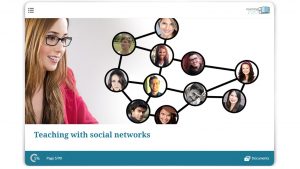Social networks have become a vital part in our everyday lives, and education is no exception. Module 5 discusses how social networks can be used as effective teaching instruments. The five chapters focus on the following key topics:
- Social networks as teaching tools
- Social networks as innovative teaching instruments
- How to use social media for collaboration
- User generated contents of social networks
- Risks and challenges when implementing social networks
Module 5 focuses on two functions of social networks: the role of collaboration and the creation of user generated contents. The Module shows how teachers can use social networks for collaborative learning and discusses in what way they can implement user generated contents in their teaching. It also highlights the risks and challenges users need to be aware of when implementing social networks in the teaching and learning process.
The iLab manual Module 5 offers you additional information, useful links and helpful suggestions for Module 5 to enrich your teaching. Based on the cBook it can be used in everyday teaching to deepen some topics or in combination with the iLab (innovation Lab). The iLab is the two-day on-site training course of #Teaching2030, either provided by a project team member or organized in a self-directed way by university teachers. The iLab gives you the opportunity to try out new approaches, methods and competencies from the cBook.
 The Faculty of Tourism and Hospitality Management in Opatija is the legal entity within the University of Rijeka, consisting of 7 institutes and performing study programs from undergraduate to doctoral studies and LLL programs. It is the only university institution in Croatia fully oriented to education for managerial positions in tourism and hospitality industry and to the scientific human resources development in this field. The Faculty promotes knowledge and excellence while respecting the highest ethical principles and intensively developing national and international partnerships.
The Faculty of Tourism and Hospitality Management in Opatija is the legal entity within the University of Rijeka, consisting of 7 institutes and performing study programs from undergraduate to doctoral studies and LLL programs. It is the only university institution in Croatia fully oriented to education for managerial positions in tourism and hospitality industry and to the scientific human resources development in this field. The Faculty promotes knowledge and excellence while respecting the highest ethical principles and intensively developing national and international partnerships.

